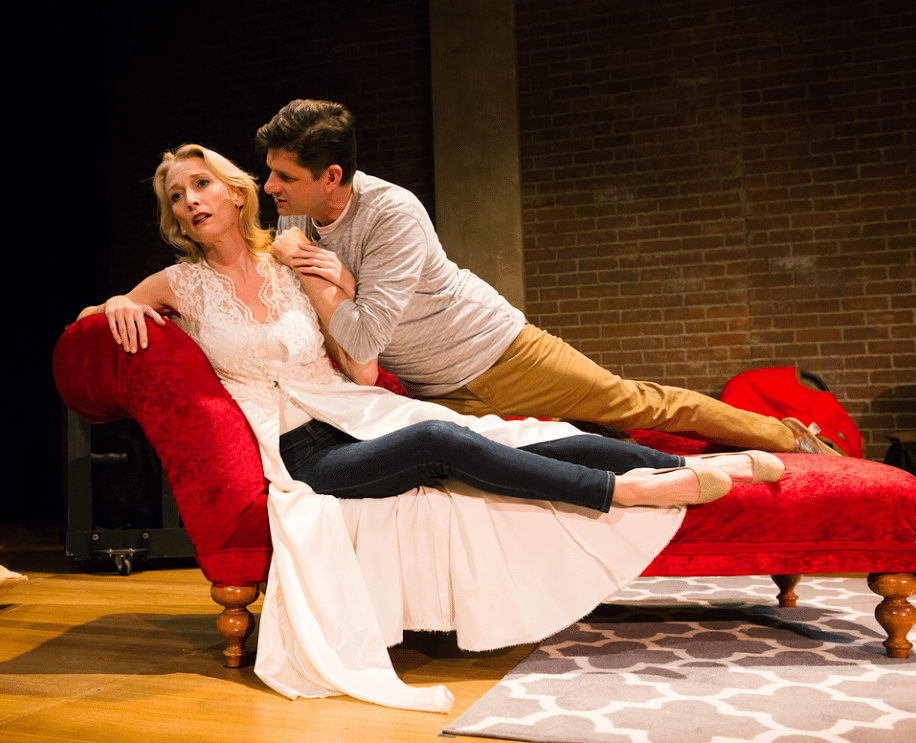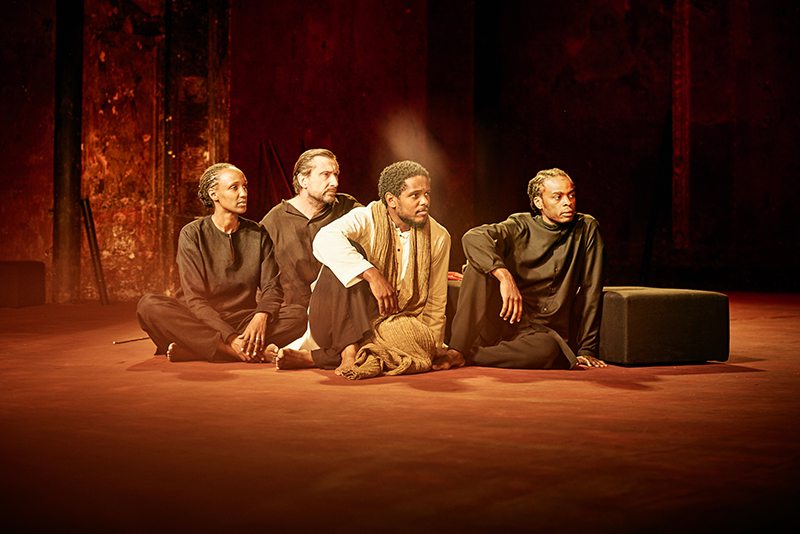By Charles Brousse
Let me get right to the point. In both content and performance, San Francisco Playhouse’s current production of Sarah Ruhl’s romantic farce, Stage Kiss, is one of the year’s most entertaining evenings of theater, a perfect accompaniment to the holiday season’s happy mood.
Now, that’s quite an admission coming from one who has been somewhat skeptical of Ruhl’s meteoric rise to prominence. During the past few seasons, works like In the Next Room, (or The Vibrator Play), The Clean House, Eurydice, Orlando, The Oldest Boy and Dead Man’s Cell Phone have been produced by Bay Area theaters, at times in overlapping clusters. National awards, prizes and even a coveted MacArthur Fellowship have recognized her achievements.
Still, while admiring Ruhl’s abundant theatricality, I’ve sensed a tendency to show off by dazzling audiences with over-calculated novelty one minute, followed by preachy asides (many feminist-related) the next. She has seemed more interested in creating a theatrical effect, with an impact that is mainly intellectual, rather than developing an emotional involvement in her characters’ lives.
This is why, for me, Stage Kiss is such a welcome arrival. Despite its intermixing of reality and on-stage fantasy, the play is a rather simple, very funny, very warm-spirited satire of how art mimics life and vice versa. No puzzling twists in the storytelling, no urgent half-hidden messages—it is what it is, and it succeeds wonderfully.
Building on the well-known public curiosity about what takes place in the mysterious world behind the footlights, Ruhl takes us to a rehearsal room where a group of actors, their director and an all-purpose understudy are working on a key section of their revival of an early 1930s potboiler, ominously entitled The Last Kiss. The script calls for the male lead (identified as “He”) to plant a credible smack on the lips of the female lead (“She”).
Trouble is, what should be an easy task for professional actors, isn’t, because He and She were lovers some years before, which makes their stage intimacy fraught with hostile emotional baggage. At the director’s urging, they practice over and over without getting it right and, when called upon, Kevin (Allen Darby), the gay understudy, is even clumsier. As the frustration level rises, a kind of panic sets in. Adroitly staged by San Francisco Playhouse’s Susi Damilano, this scene gets the evening off and running with about 10 minutes of antic comic fun.
Soon, however, the mood changes. Reluctant daily kisses that He and She exchange fan the dormant sparks of their abandoned relationship. Now, the burning questions are: Will She abandon a solid marriage and a 16-year-old daughter? Is He prepared to close the door on the loving young school teacher who now shares his life? Sorry, I’m no spoiler. You’ll have to attend to find out.
Damilano’s cast is first-rate. As She, Carrie Paff presents her finest performance among the many I’ve witnessed. She’s an attractive blond, but not a Hollywood-style bland beauty. There’s a certain awkwardness about her that, combined with a seemingly inexhaustible energy, makes her fascinating to watch.
Gabriel Marin (He) is Paff’s perfect foil. Laconic, slightly befuddled but well-meaning, he projects an appealing innocence as he follows his quixotic partner step by step in a comic dance that reminds me of self-effacing Ginger Rogers’ response to Fred Astaire’s bravura slides and glides.
The two leads are given solid support by Mark Anderson Phillips (Director), Michael Gene Sullivan (Husband), Allen Darby (various roles), Millie DeBenedet (Laurie/Millicent) and Taylor Iman Jones (various). All-purpose San Francisco Playhouse artistic director Bill English supplies the adaptable sets and is co-writer (with Theodore J.H. Hulsker) of an original piano composition that adds to the festive atmosphere.
NOW PLAYING: Stage Kiss runs through January 9 at the San Francisco Playhouse, 450 Post St., San Francisco; 415/677-9596; in**@*********se.org.








